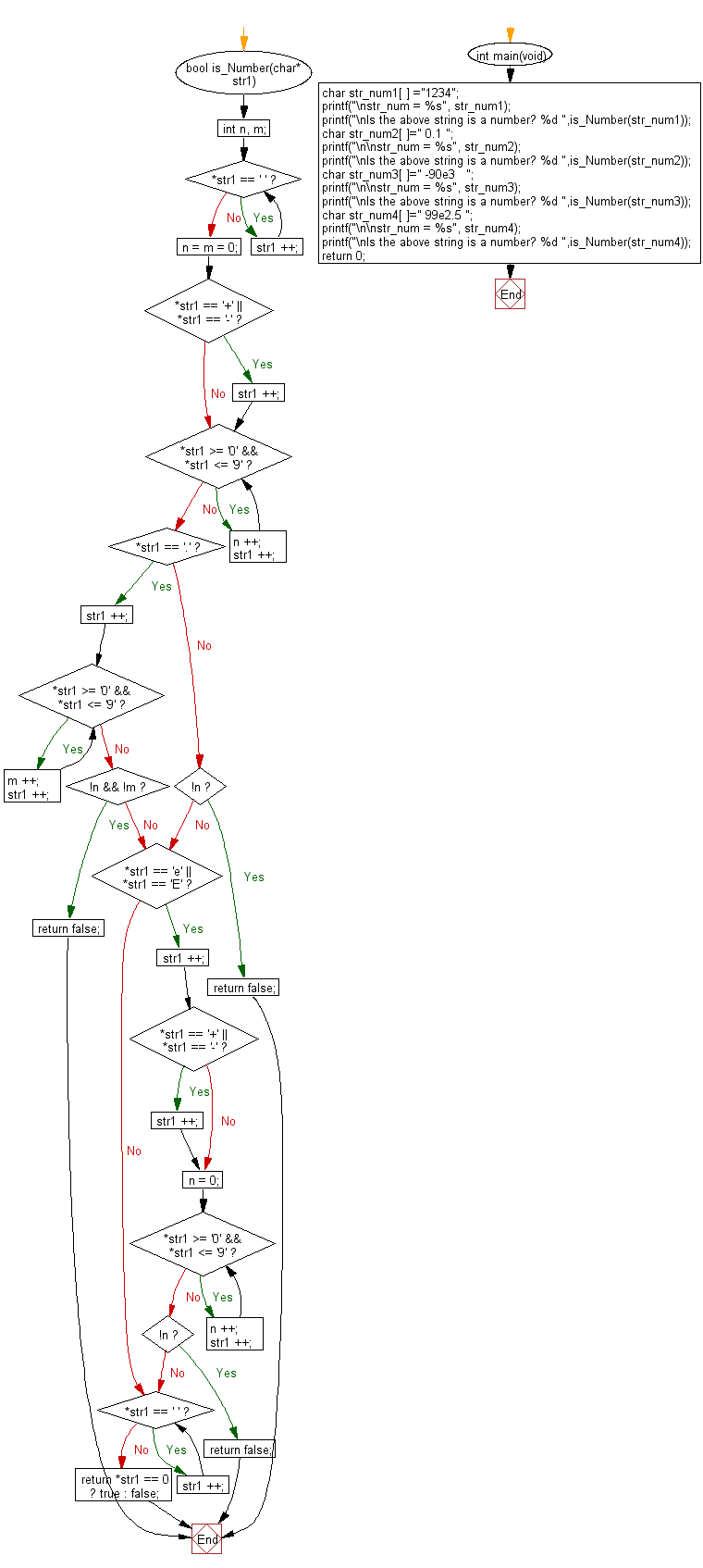C Exercises: Check if a given string can be interpreted as a decimal number
6. Decimal Number String Check Variants
Write a C program to check if a given string can be interpreted as a decimal number.
Example:
Input:
str_num1[ ] ="1234"
str_num2[ ]=" 0.1 "
str_num3[ ]=" -90e3 "
str_num4[ ]=" 99e2.5 "
Output:
Is the above string is a number? 1
Is the above string is a number? 1
Is the above string is a number? 1
Is the above string is a number? 0
Sample Solution:
C Code:
#include <stdio.h>
#include <stdlib.h>
#include <string.h>
#include <stdbool.h>
// Function to determine if a given string is a valid number
bool is_Number(char* str1) {
int n, m;
// Skip leading spaces
while (*str1 == ' ') str1 ++;
n = m = 0;
// Skip the sign of the number
if (*str1 == '+' || *str1 == '-') str1 ++;
// Loop to check for digits before a possible decimal point
while (*str1 >= '0' && *str1 <= '9') {
n ++;
str1 ++;
}
// Check if there is a decimal point
if (*str1 == '.') {
str1 ++;
// Loop to check for digits after the decimal point
while (*str1 >= '0' && *str1 <= '9') {
m ++;
str1 ++;
}
// If no digits found before or after the decimal point, return false
if (!n && !m) return false;
} else if (!n) {
// If no digits found before a decimal point, return false
return false;
}
// Check for exponent notation (e.g., 1.23e45)
if (*str1 == 'e' || *str1 == 'E') {
str1 ++;
// Check for sign after 'e' or 'E'
if (*str1 == '+' || *str1 == '-') str1 ++;
n = 0;
// Loop to check for digits in the exponent
while (*str1 >= '0' && *str1 <= '9') {
n ++;
str1 ++;
}
// If no digits found in the exponent, return false
if (!n) return false;
}
// Skip trailing spaces
while (*str1 == ' ') str1 ++;
// Return true if the entire string has been checked and no invalid characters found
return *str1 == 0 ? true : false;
}
// Main function to test the is_Number function with different strings
int main(void) {
char str_num1[] ="1234";
printf("\nstr_num = %s", str_num1);
printf("\nIs the above string a number? %d ", is_Number(str_num1));
char str_num2[]=" 0.1 ";
printf("\n\nstr_num = %s", str_num2);
printf("\nIs the above string a number? %d ", is_Number(str_num2));
char str_num3[]=" -90e3 ";
printf("\n\nstr_num = %s", str_num3);
printf("\nIs the above string a number? %d ", is_Number(str_num3));
char str_num4[]=" 99e2.5 ";
printf("\n\nstr_num = %s", str_num4);
printf("\nIs the above string a number? %d ", is_Number(str_num4));
return 0;
}
Sample Output:
str_num = 1234 Is the above string is a number? 1 str_num = 0.1 Is the above string is a number? 1 str_num = -90e3 Is the above string is a number? 1 str_num = 99e2.5 Is the above string is a number? 0
Flowchart:

For more Practice: Solve these Related Problems:
- Write a C program to validate if a string represents a valid decimal number using state machine logic.
- Write a C program to check decimal validity by manually parsing the string character by character.
- Write a C program to determine if a string is a number, handling optional spaces, signs, and decimal points.
- Write a C program to validate a numeric string and flag errors if multiple decimal points or invalid characters are found.
Go to:
PREV : Kth Permutation Sequence Variants.
NEXT : Fractional Part Extraction Variants.
C Programming Code Editor:
Improve this sample solution and post your code through Disqus.
What is the difficulty level of this exercise?
Test your Programming skills with w3resource's quiz.
